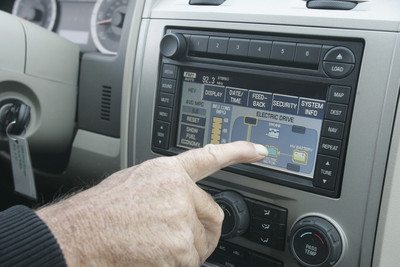Schools, students plugging into hybrid repairs
When the world changes, those who teach about the world must change, too.
That's why Paul Pate, the director of transportation programs at the College of Southern Nevada, needed to learn all he could about electric motors.
He is in charge, after all, of teaching future mechanics how to fix cars. If he didn't know how to fix an electric car, how was he supposed to teach others?
Electric cars are here now, in the form of hybrids, and they need to be maintained.
Which is why CSN's auto technology program has four of them.
The newest is a Chevrolet Malibu hybrid that arrived a few weeks ago.
"We're trying to get enough vehicles so our students will be exposed to all the types," Pate said.
The program has a Toyota Prius, a Honda Civic and a Ford Escape, too, all hybrids. The cars have electric motors and gasoline engines.
So, in addition to learning about fixing regular cars, trucks and buses, students have to learn to fix those as well.
Student Agustin Mota, 22, one day wants to run his own shop. So he has to learn about everything.
"You have to always keep ahead of the game," Mota said. "Every five or six years, you've got a new technology coming out. It's constantly changing."
In the garage area last week sat a Ford Mustang with most of its engine missing, a couple of big semi tractors, a front loader and a humongous RV, all in different states of repair.
Diesel engines, including one that runs on compressed natural gas, sat on racks. A camshaft and a crankshaft shared a bench.
Pate said the auto technology program doesn't have a separate course of study for students to learn just about hybrids. "We try to roll the alternative fuels component into everything we teach. We want them to be prepared for every type of vehicle they'll see."
And there's a lot to learn. Working on a hybrid can, quite literally, kill you.
Pate lifted the battery cover on one of the hybrids, where 300 amps of electricity course through fat orange wires.
"That could reduce you to a pile of dust in a millisecond," he said.
Robert Mundt, 20, said it's all part of becoming a better mechanic. He's currently working at Desert BMW.
"It's a lot different," he said of learning about hybrids. "There's a lot more safety precautions."
There's the electricity. There's also a complicated computing system, which requires its own cooling system.
Most hybrids use a different oil than regular cars, different tires and a different braking system.
Even body work is different. You can't subject a hybrid's battery to the high temperatures required for some paint jobs.
You'd want your mechanic to know all of this, especially now, when hybrids are getting popular.
"There will be, in the next three to five years, 25 models or more," Pate said. "This is the kind of car our students will see."
Eventually, there will be fully electric vehicles. There will be hydrogen powered cars. And who knows what else.
Contact reporter Richard Lake at rlake @reviewjournal.com or 702-383-0307.


















